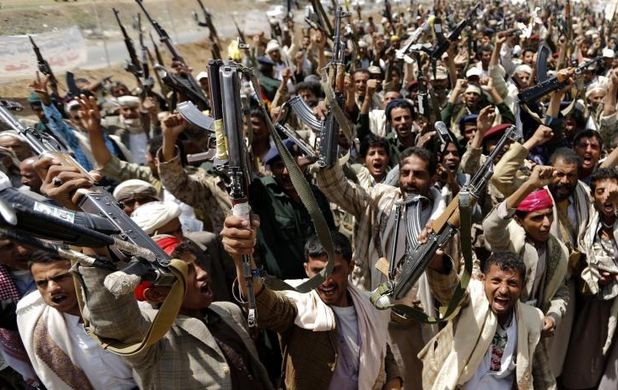Saudi Arabia and its Arab partners in the Gulf Cooperation Council have launched airstrikes on Houthi rebels threatening to overrun Yemen while its army prepared to cross the border into Yemen to engage the Shia rebels.
Saudi ambassador to the United States Adel bin Ahmed Al-Jubeir announced the Saudi military action in Washington D.C. saying the attacks on the Houthis began 7:00 p.m. Eastern time today, March 25.
He said the embattled Yemeni government led by President Abd-Rabbu Mansour Hadi, who is also supported by the U.S., requested military intervention after his pro-West government was overthrown by the advancing rebels.
"The operation is to defend and support the legitimate government of Yemen and prevent the radical Huthi movement from taking over the country," said al-Jubeir.
He said the Saudis "will do anything necessary" to protect the people of Yemen and "the legitimate government of Yemen" from the Houthis, who "have always chosen the path of violence."
Early press reports said the six member GCC was being supported by four other unnamed Muslim countries.
Earlier on Monday, al-Faisal said Arab countries would take necessary measures to protect the region against "aggression" by the Houthi movement if a peaceful solution couldn't be found.
The Yemeni president is reported to have been in hiding in the city of Aden after being chased out of the capital Sana'a by the Houthis, a tribe supported by Iran, Saudi Arabia's great rival for influence in the Horn of Africa. The remaining military forces loyal to Hadi have been defending Aden since the president fled Sana'a in February.
Saudi Arabia is a predominantly Sunni Arab country while Iran is a Shia Arab power. The conflict between the legitimate Yemini government and the Houthis turned into a proxy war between the Saudis and the Iranians.
Al-Jubeir refused to comment on what type of support the U.S. was providing the military invasion. He did say the Saudi military would provide updates on the progress of the invasion.
The rebels on Monday seized the Al-Anad air base 35 miles from Aden used by the U.S. to launch drone strikes against the Al-Qaida affiliate operating out of Yemen and captured the Yemini defense minister. Yemen was the main base for the U.S. war on terror in the Horn of Africa until all U.S. military personnel were pulled out last week.
Indications of the Saudi intervention recently became apparent with a rapid and massive build-up of Saudi military forces on its 1,800 kilometer-long southern border with Yemen. One U.S. government source described the size of the Saudi buildup on Yemen's border as "significant".
"The Saudis are just really deeply concerned about what they see as an Iranian stronghold in a failed state along their border," said U.S. Ambassador to Yemen Matthew Tueller to Reuters.
In March 2011, Saudi troops, along with those from the United Arab Emirates, entered neighboring Bahrain after weeks of protests by that country's Shi'ite majority that Riyadh feared could lead to an expansion of Iran's influence.
The Houthis are a minority religious group from northern Yemen. They're allied with Yemeni troops still loyal to former President Ali Abdullah Saleh, the longtime strongman who was removed from power amid the Arab Spring uprising, but who now appears to be orchestrating a comeback in alliance with the Houthis.



























